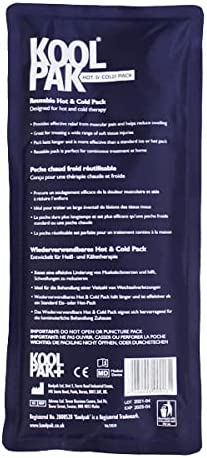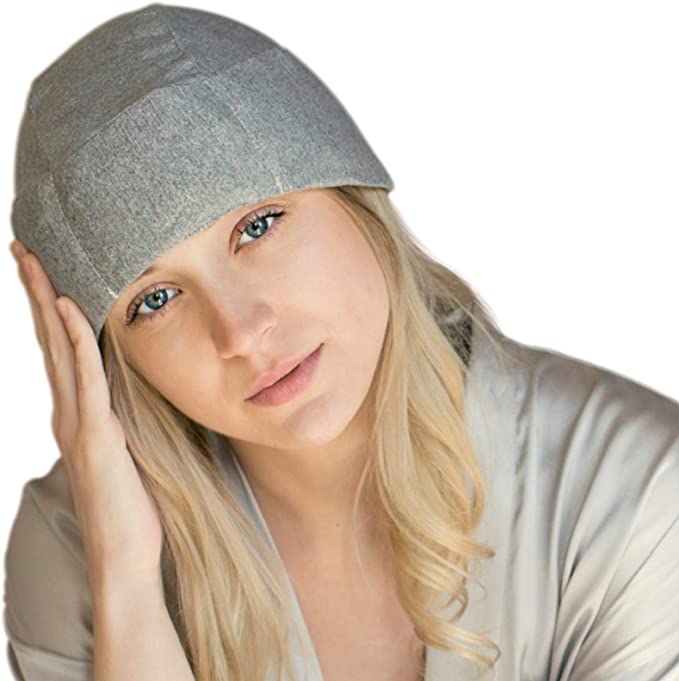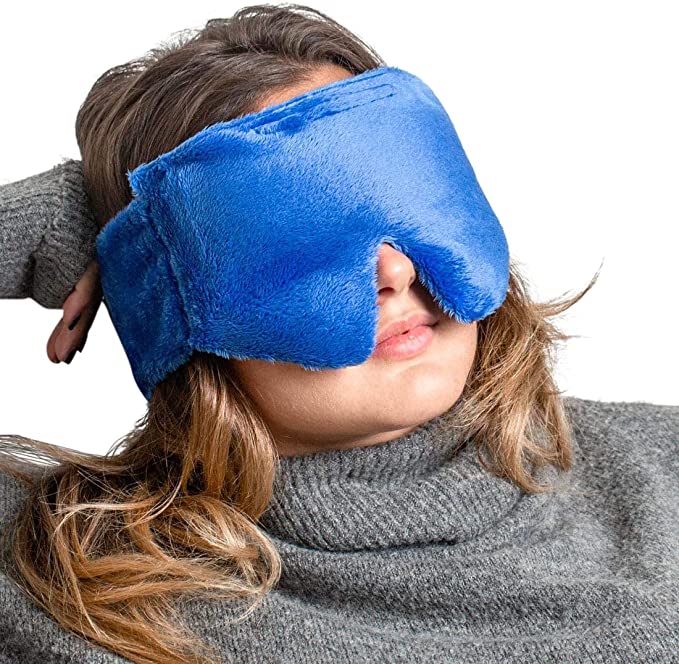This Ice Hack Helped Me Fall Asleep In 15 Minutes
Photographed by Anna Jay.
Fellow insomniacs: the answer to our sleep deprivation has been sitting in the freezer all along. At least that's what TikTokers like @heyfrankiesimmons, @empathary and @borcikjewelry are saying. Apparently, placing a simple ice pack on your chest might lull you to sleep in just 15 minutes.
Insomnia has ruled my waking life for the best part of my 20s. Whenever I’ve had a reasonably good night's sleep — which happens about twice a week — I work better the next day, I eat more healthily, I’m more ambitious, and I feel myself becoming kinder. The rest of the time, I experience the sort of aching anxiety that comes with a hangover (even when I haven’t had a nightcap), paired with feelings of being slow, distracted and unexcited. As well as the well-documented, immediate consequences of insomnia, there are potentially serious and long-term health problems, "including obesity, coronary heart disease and diabetes — and it shortens your life expectancy," according to the NHS website. "What happens if I don’t sleep?" asked Kiss FM DJ Daisy Maskell in a BBC documentary on the rise of insomnia in Gen Z. "Almost every article tells you eventually that you’ll die from it." And so the anxiety viciously spirals.
Insomnia has ruled my waking life for the best part of my 20s. Whenever I’ve had a reasonably good night's sleep — which happens about twice a week — I work better the next day, I eat more healthily, I’m more ambitious, and I feel myself becoming kinder. The rest of the time, I experience the sort of aching anxiety that comes with a hangover (even when I haven’t had a nightcap), paired with feelings of being slow, distracted and unexcited. As well as the well-documented, immediate consequences of insomnia, there are potentially serious and long-term health problems, "including obesity, coronary heart disease and diabetes — and it shortens your life expectancy," according to the NHS website. "What happens if I don’t sleep?" asked Kiss FM DJ Daisy Maskell in a BBC documentary on the rise of insomnia in Gen Z. "Almost every article tells you eventually that you’ll die from it." And so the anxiety viciously spirals.
AdvertisementADVERTISEMENT
If you're like me, you don’t have an issue falling asleep. Instead, your mind pings on in the middle of the night like a microwave done cooking and immediately starts coagulating with thoughts of that half-written, overdue article or that thing you probably shouldn’t have said to your high school best friend eight years ago. According to research, insomnia is endemic: 55% of 18 to 24-year-olds in the UK say they find it hard to get to sleep at least once a month. Google searches for “sleep aid” hit a five-year peak in January 2022, especially for Melatonin, which increased 36% from December 2021 to January 2022, as it has for the past few winters. Unsurprisingly, the majority of these searches were made between 1 am and 4 am.
It's 1.30 am and I'm scrolling through my FYP when I see a post from wellness influencer @heyfrankiesimmons that piques my sleep-malnourished brain (thank you, algorithm). In it, she posits a potential, simple cure for nighttime wake-ups. "A couple of years ago, it was a very regular occurrence for me to wake up at 4:00 am with anxiety all the time," she says in the TikTok. "I’d have to pull myself out of bed and do all this breath work and energy work, and tea drinking, and like spend forever trying to calm myself down and go back to sleep."
AdvertisementADVERTISEMENT
All that changed when she learned about icing the vagus nerve. Sometimes referred to as the body’s communication superhighway, the vagus nerve is one of the longest nerves in your body and controls a lot of your parasympathetic nervous system — a network that keeps basic bodily functions working as they should, from producing tears to sneezing to the male erection. Within this network, the vagus nerve also controls mood and heart rate.
For the last four or five years, activation of the vagus nerve has been discussed by elements of the wellness community as a potential helper in stress alleviation, and there appears to be some scientific basis for this. "By developing an understanding of the workings of your vagus nerve, you may find it possible to work with your nervous system rather than feel trapped when it works against you," explains clinical psychologist Dr Arielle Schwartz. Meanwhile, a 2018 study uncovered "preliminary evidence that vagus nerve stimulation is a promising add-on treatment for treatment-refractory depression, post-traumatic stress disorder, and inflammatory bowel disease."
But why is it that icing or cooling the vagus nerve might help? It comes down to the 'tone' or 'activity' of your vagus nerve. Stimulating your 'vagal tone' helps you regulate your heart rate, among other things, meaning that your body can relax faster after stress.
According to another 2018 study, regulating temperature can be a good way of stimulating the vagus nerve: "The results demonstrate a pattern of cardiovascular reactivity to cold stimulation, suggesting an increase in cardiac-vagal activation. The effect was significant for cold stimulation in the lateral neck area." In layman's terms, putting something cold on your upper torso can activate the vagus nerve and help calm you down.
It follows, then, that putting an ice pack on your chest could de-stress you enough to send you off to sleep. "Wrap it in a towel, lie down for at least 15 minutes, or longer if you need to," Frankie says in the TikTok. "It is *chefs kiss* – a game changer."
It follows, then, that putting an ice pack on your chest could de-stress you enough to send you off to sleep. "Wrap it in a towel, lie down for at least 15 minutes, or longer if you need to," Frankie says in the TikTok. "It is *chefs kiss* – a game changer."
AdvertisementADVERTISEMENT
After years of restlessness, failed moonlit meditations and copious half-drunk herbal teas on the nightstand, I was ready to give anything a go. So I set out to try the viral ice pack hack for a week. Here’s how it went...
Day One (Monday)
Woke up at 1.30 am. I pulled myself out of bed in search of an ice pack. Found one in the freezer, headed back to bed and placed it on my chest. The only thing I can describe it as is like slurping down cool ice cream after a hot dinner. It's vaguely uncomfortable but refreshing. I last remember looking at my phone clock at 2.45 am and the next thing I knew I was waking up with my alarm at 7 am, with a cold, wet patch on my bedsheets (sexy). I thought: Must remember a bowl to put the ice pack in after I'm done using it tomorrow.
Day Two
Pinged awake at 3 am and fetched the ice pack. Dog came with me and needed to wee and the cold blast of air from the garden felt like foreshadowing. I wondered if it was just the act of getting out of bed that was helping me fall asleep, which is another proven sleep technique. Got back in bed, blanket-wrapped ice in tow, and fell back asleep in about half an hour. Remembered the bowl this time, too – success! I woke up again with my alarm at 7 am.
Day Three
Slept through the night, no ice required. Zzz!
AdvertisementADVERTISEMENT
Day Four
Woke up at 2.30 am and fetched the ice pack but barely needed it. Felt like I was asleep again before my head hit the pillow. Wondered: Is this a placebo effect? Am I willing the ice pack to the point where it’s actually effective? I don’t really care, either way.
Day Five
Woke up at 4 am and forgot all about the ice pack. (Remind me never to take part in a real clinical trial.) Scrolled on TikTok until 7 am when I got up with my alarm.
Day Six
Arguably my worst night of sleep so far. Drank too much white wine that evening so I fell asleep like falling in front of a bus but woke up at half-past midnight with blood pumping in my ears, probably from too much sugar in the wine. Instant regret. Couldn’t bring myself to head downstairs to get the ice pack so I just lay in bed listening to my partner’s teeth grinding until 4 am, when I decided to get up, tetchy, anxious and ready to ruin Sunday.
Day Seven
Went to bed at 9 pm, exhausted. Slept through the night, no ice pack required.
To summarise, of the nights I woke up, the ice pack hack seemed to send me off to sleep quicker than usual. But I remain unconvinced that it was the ice that was doing it and not the act of getting out of bed and fetching it. The middle-of-the-night routine became oddly ritualistic. I enjoyed the midnight stroll into the kitchen in the moonlight, getting blasted by the freezer air in my nightdress. It's like the cold side of the pillow, but for your whole body.
AdvertisementADVERTISEMENT
I am no sleep physician, nor are many of the TikTokers recommending this hack. It is always best to contact your doctor with any medical concerns to do with your sleeping patterns or behaviours. But as a longtime insomnia sufferer, I am a great believer in the following: if it works for you, keep at it. So I will be reaching for an ice pack in the middle of the night for a long time to come (unless I finally figure out how to sleep through the night, that is).
At Refinery29, we’re here to help you navigate this overwhelming world of stuff. All of our market picks are independently selected and curated by us. All product details reflect the price and availability at the time of publication. If you buy or click on something we link to on our site, we may earn a commission.
AdvertisementADVERTISEMENT









